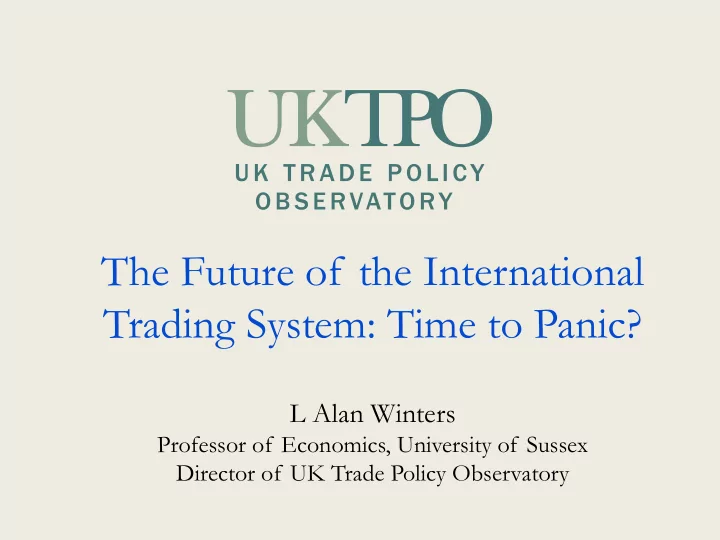

The Future of the International Trading System: Time to Panic? L Alan Winters Professor of Economics, University of Sussex Director of UK Trade Policy Observatory
Outline • What remains to be done in trade policy? • Why has trade become so difficult? • Why are electorates suspicious of trade? • The present dangers • What can we do about it – Global and Domestic? • Time to panic? 2
Some Major Successes Average Tariffs, USA, Western Europe, Japan, 1947-1999 Bown and Irwin (2015) 3
But there is still a way to go Average Tariffs and Bindings, 2013, by country group Bown and Crowley, (2016) 4
Plus Non-Tariff Measures on Goods • NTMs – e.g. quotas, regulation and certification (which may have benefits), trade frictions EU to US US to EU Aerospace 19.1 18.8 Automotive 26.8 25.5 Cosmetics 32.4 34.6 Electronics/Elec. Machinery 6.5 6.5 Processed food 73.3 56.8 Wood and paper products 7.7 11.3 Source: Berden and Francois (2015) 5
And on Services Trade • Regulations – e.g. qualifications, procedures, prudential EU to US US to EU Construction 2.5 4.6 Communications services 1.7 11.7 Banking 31.7 11.3 Insurance 19.1 10.8 Other business services 3.9 14.9 Source: Berden and Francois (2015) • The critical margin is regulation and NTMs, not tariffs 6
But ‘deep integration’ is difficult • Because regulation is: – Complex – Deeply embedded in history and culture – Owned by Regulatory Bodies - usually not ‘open’ – Often captured by incumbents - firms – Effects of reform are uncertain – Once changed, difficult to reverse 7
Why are electorates suspicious of trade? • Economics: it affects distribution it emphasises markets, not values • Social: it constrains local discretion (via costs and rules) it introduces ‘foreign’ things/ideas • Political: it seems to benefit foreigners it seems to be controlled by corporates • Ignorance: President Trump has the wrong model ! 8
Where are we now – developed countries? • Political suspicion – populists harnessing and fomenting popular disquiet – But they have a flawed narrative • Industry mostly losing interest – because feasible gains look too small. Big gains look infeasible. • Inappropriate corporate behaviour undermines public trust – and not just China – Volkswagen – Money laundering – Pensions fraud 9
The present dangers • The hegemon is losing interest – ‘diminished giant’ • Undermining WTO – i.e. rules-based system – Aggressive use of trade defence instruments = normal! – Dispute Settlement Procedure – Invoking of ‘national security’ defence (Section 232) • Followed by negotiation under duress and quotas (VERs) • Undermining its own rules-based system - ZTE • Undermining reputation – Iran, TPP, NAFTA 10
The Protectionist Spring, 2018 • Section 301 – like the 1980s • $50 billion of tariffs threatened - (+ $100 bn.?) • Excessive demands of China • Cease-fire – China buys more gas and soy beans – Sources of friction remain – IP, investment – Trump objectives – deficit, manufacturing jobs – immune to such treatment – Diverts pressure to weaker partners • ‘Big man’ politics – they want to agree outcomes not rules or regimes. 11
What can we do about it? Global • Support WTO more actively – Use every opportunity to persuade/explain – Try to create coalitions to address critical issues, so the agenda can advance. • Present a united front – difficult – Others will have to provide more leadership – Try to bind China into collective response • Proceed with alternative agreements – TPP, EU-Japan 12
What can we do about it? Domestic • Recognise more interests in changing trade policy – Governments, maybe corporates too • Procedural legitimacy in approaching FTAs – Would involve greater transparency • Greater willingness to engage by pro-trade groups • Possibly, design agreements to ease specific stresses 13
Time to panic? • Not quite – we need cool heads – But it is pretty alarming • Don’t take the rules -based system for granted • Uncertainty is already biting • Renew efforts to address the critical issues – They affect us all – They now pose an existential threat 14
Thank you https://blogs.sussex.ac.uk/uktpo/ 15
Recommend
More recommend